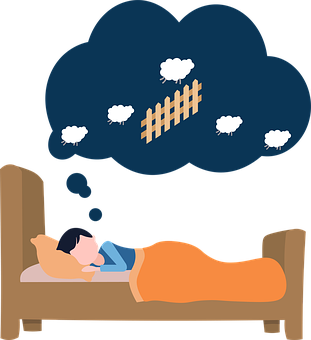
Insomnia* is common for cancer patients**, as well as for the general population. We frequently hear from our patients and their caregivers that sleeping through the night is just tough. It can take a toll on our physical and emotional selves! Sleep is important for all of us. Here are a few thoughts that may be helpful to help manage insomnia.
Medication Options
- Large-scale studies have not proven the long-term benefit of insomnia medications.
- Any medications should not be used for more than several days at a time.
- Although sleep hygiene and behavioral strategies should be first tried for insomnia, there are some people who may need medication for a short period of time to help with sleep.
- Medication may be particularly important if you also have significant anxiety or depressive symptoms.
- Because not all sleep medications are the same and because some should not be used for older people or those with certain medical issues, please talk with your healthcare provider about which medication might be helpful for you.
- Always discuss supplement use with your provider as well. Some of these supplements can interact with certain cancer treatments. It is important your provider knows if you are taking supplements to help with sleep (like Melatonin or St. John’s Wort).
Psychological
- Think about Cognitive Behavioral Therapy (CBT). Its been found to be a very effective therapy for changing thoughts and behaviors that lead to disruptive sleep and includes relaxation techniques and sleep hygiene education.
Nutrition
- Avoid caffeine, especially in the evening (including coffee, tease, chocolate, sodas).
- Foods, beverages and supplements promoting “energy enhancement” generally have caffeine in them.
- Don’t eat late at night or go to bed on a full stomach.
- Discuss herbs and supplements such as Melatonin or Valarian with your health provider.
Exercise and Activity
- Energy conserving techniques
- Keep an activity log
- Development of an exercise program
Other Relaxation Techniques
Practice Sleep Hygiene
- Create a restful and calm sleep environment.
- Incorporate daily exercise, but not too close to bedtime.
- Limit substance use including nicotine, alcohol, and caffeine.
- Don’t smoke. Stay away from all forms of tobacco. Not only has it been linked to several types of cancer; the nicotine in tobacco can keep you awake.
- Go to bed and get up from bed at the same time every day.
- Avoid long daytime naps. Keep your daytime naps to 30 minutes or less. And, don’t take a nap within several hours of bedtime.
- Write it out. Keep a pen and paper by your bed if you are prone to wake up and worry about the next day’s events. Jot down your reminder and fall back to sleep.
- Keep the bedroom quiet, peaceful, relaxing, and dark
- Cool it down. Check the temperature of your bedroom. Some studies show that the optimum bedroom temperature should be between 65 to 72 degrees for sound sleep.
- Wear socks if your feet are cold. Cold feet can keep us awake and alert. Warm feet could mean more sleep.
- Invest in a white noise machine. Many people are sensitive to background noise. A good way to calm the mind and block out ambient noise is to use a fan or white noise machine or other device or app that mimics soothing sounds such as an ocean, a rainforest, a river, or a thunderstorm.
- Use the bed only for sleep, remove TV from the bedroom
- Power down. The blue light from cell phones, tablets, TV, and computer screens suppresses melatonin, which directly interferes with sleep. So, shut off your electronic devices in the evening, and leave them off until morning.
- Create a calming ritual before bed such as quiet time, herbal tea, relaxing music
- Change nighttime beverages to soothing teas, such as caffeine-free chamomile or lavender tea.
*Definition: Insomnia is an ongoing pattern of sleep disturbance; difficulty falling asleep or staying asleep, which persists for longer than one month.
**Impact on patients with Cancer: Studies have estimated that between 30-75% of patients with cancer experience insomnia, either alone or in conjunction with other symptoms, such as fatigue, pain, and emotional issues.
Lucretia Hurley-Browning, MDiv, MS, is a guest writer whose recent background includes Chaplain of the Abramson Cancer Center at Pennsylvania Hospital and the Director of Juniper Tree Counseling Center. She is a therapist and ordained United Methodist Minister. Currently, she is a writer by day, a reader by night, and is passionate about living life meaningfully with a good dose of fun.






